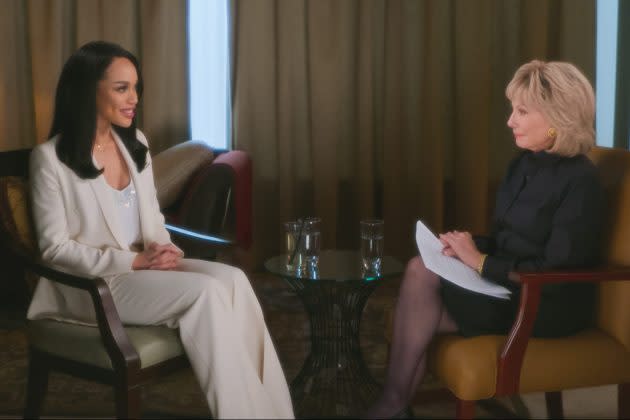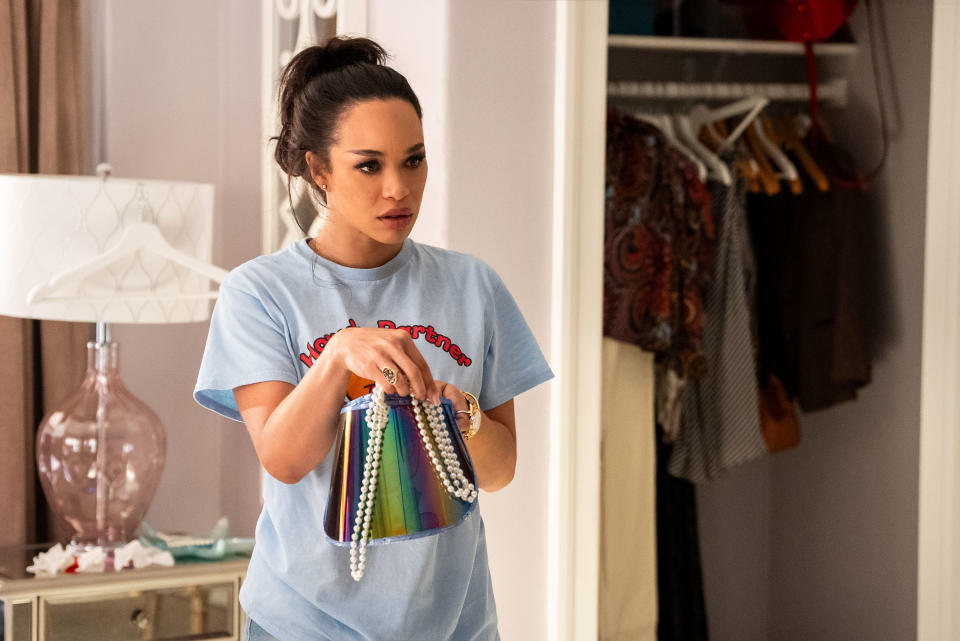‘Clipped’ Star Cleopatra Coleman on Recreating V. Stiviano’s Barbara Walters Interview and Her ‘Earnest’ Desire for Fame: ‘If She Had a Kris Jenner, She’d Become a Kardashian’

On April 25, 2014, TMZ released recordings of Los Angeles Clippers owner Donald Sterling criticizing his assistant V. Stiviano for “associating with Black people.” The following week, Stiviano, a biracial Black woman, sat across from Barbara Walters on ABC News and called herself Sterling’s “confidant,” “best friend” and, most bizarrely, his “silly rabbit.”
In a moment that has since been memed into oblivion, Walters asked for a little clarification: “His what?” Stiviano repeated herself, but when Walters asked, “His silly rabbit? Is that what he calls you?” Stiviano gave a quiet, “No.”
More from Variety
Cleopatra Coleman has her own understanding of the nickname.
“Obviously, he does call her that,” says the actor, who plays V. in “Clipped,” the soapy FX limited series based on the scandal surrounding L.A.’s “other” basketball team. Indeed, in the show’s first episode, Donald (Ed O’Neill) calls V. his silly rabbit in private, during a tender conversation she apparently wouldn’t want Walters to know about.
“I guess, in that moment, she doesn’t like the way that sounds, and maybe she looks at the way Barbara Walters is responding to that, and she maybe would like to rescind that comment,” Coleman says, trying to make sense of the real V.’s trip-up. “But it’s too late. It’s just one of those really bizarre things that happen when you’re feeling exposed. You’ve got a spotlight on you, and you’re not quite sure what to say. You’re saying things before you think, and the next thing you know, you’re trying to take it back.”
Stiviano briefly became a tabloid obsession after the TMZ leak, and especially drew attention for the offbeat way she presented herself in public — from the ABC clip to the colorful visor and rollerskates she wore to exit her house as it was surrounded by paparazzi. Throughout this whole time, amid assumptions that she was a gold digger who slept with Sterling later to manipulate him in his old age, Stiviano would wear a pained smile, and maintained that she and Sterling were simply having a rough patch in their friendship after his hurtful words. Coleman didn’t find it hard to empathize with Stiviano’s choices, but she hadn’t predicted the emotional toll the role would take.

“I really felt like I knew exactly what to do with V. at our first table read, then suddenly, I found myself feeling very exposed,” she says. “After I unpacked it, I realized it feels dangerous to play a woman that is at risk of not being liked. As an artist, that’s something that normally excites me. But there was something about her being a real person. Suddenly, I — Cleo — felt so exposed.”
“For my process, I really had to put aside my need to be liked,” she continues. “I had to focus on what it means to be a woman that takes up space. It can be dangerous, socially. It made me look at her in an even deeper way than I’d prepared to.”
Coleman has never met Stiviano. “I treated her like any other character, and focused on her as a character on the page, so it didn’t feel like necessary to speak with her,” she says. (“Having said that, if she wanted to, absolutely I would,” Coleman adds.)
Therefore, her take on V.’s feelings and motivations came directly from conversations with showrunner Gina Welch. For example, given the gray area V. and Donald’s relationship lived in, the “Clipped” team chose to believe Stiviano that it was never about sex.
“We were mirroring the scandal itself. Because it was ambiguous when it all came out, we followed that instead of adding things that changed the dynamic, but as a performer, you need to be specific whenever you can,” Coleman says. “I decided that V. and Donald hadn’t slept together. It is a little amorous, but it’s a mixed-up, father-daughter, mentor-mentee relationship, mutually beneficial and exploitative relationship. And even though I am making a choice, there is still some mystery. It’s not as black and white as ‘platonic.'”
But other parts of V.’s psychology were harder to explain. For example, early in the season, V. tells her friend Deja (Yvonna Pearson) that she’s not Black, though she later identifies as such in front of Donald.
“I can’t really speak for her,” Coleman says of the contradiction, but she offers one possible explanation: “Even if your upbringing does not emphasize being biracial, when you go out into the world, it’s really about how other people see and project onto you. She was estranged from her [Black] father, and grew up with siblings that look nothing like her. Coming from poverty and wanting to survive, she’s going to align with whatever benefits her the most. Later in the series, she has been somewhat humbled, so perhaps she’s had some time to think about her position. But she may not have arrived at a conclusion about how she feels because she hasn’t been afforded the ability to do so.”
That tension comes to a head as Walters (played here by Carolyn Mignini) grills V. about Donald’s racism. Though much of “Clipped” goes behind closed doors to add depth and context to outlandish headlines from 2014, the interview plays out almost identically to how it did in real life. We see V. don a white pantsuit in homage to Kim Kardashian and her family’s famous sitdown with Walters. Afterward, though, there isn’t much unpacking of the strange things she said on-air — a creative choice Coleman says helps to preserve the “pure, earnest and almost childlike” nature of V.’s goal to become famous.
“It was almost like [“Poor Things” protagonist] Bella Baxter: someone who doesn’t really understand what the rules are, and therefore has no trouble breaking them,” Coleman says. “It’s about what ambition can turn you into. It’s like the American dream. This is her version of it, to put on a white suit and speak to Barbara Walters follows the Kim Kardashian playbook right off into the sunset.”

At the same time, Coleman tried to imbue V. with some level of self-awareness of her own absurdity.
“Her sense of humor in regards to fame, and the way she played with fame at that time, was lost on people,” she says. “I don’t think people were understanding that she was really doing this on purpose, and she found it funny — that’s what I believe, anyway, because she’s intelligent. The part she doesn’t understand is the specifics, like, when you go talk to Barbara Walters, you don’t just wing it — you prepare. But I feel like if she had a Kris Jenner, she’d become a Kardashian.”
Putting that proto-Kardashianness on-screen required Coleman do a lot of studying, and then to let go completely.
“You can’t really compete with a viral like video like that. It’s so iconic. But I did attempt to recreate it as specifically as possible,” she says. “I remember waking up that morning, laying in bed and watching it on my phone a bunch of times in a row. I tried to get the exact timing. Then something happens when you’re acting, where you kind of go somewhere else. This was at the end of a really, really intense shooting schedule. It was a six day-week and we had a cast member that had been sick, so we rearranged the schedule so it was really heavy on myself and Laurence [Fisburne, who plays Doc Rivers].”
“I was kind of delirious, and we were on this new set that looked just like the Four Seasons. We had a real video village, a fake video village, a real cameraman, a fake cameraman — it was like ‘Twin Peaks’-bizarro,” Coleman continues. “I just remember they called ‘action,’ and I went somewhere else. It felt, at the time, electric. I don’t think I’ll ever forget it.”
Best of Variety
Sign up for Variety’s Newsletter. For the latest news, follow us on Facebook, Twitter, and Instagram.

 Yahoo News
Yahoo News 
